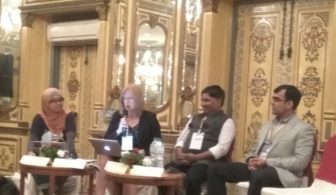Freedom of information laws now exist in over 100 countries, but despite their stated goals of increasing transparency, journalists must increasingly navigate bureaucratic resistance to obtain public data. Despite the challenges, when used effectively, documents obtained through the laws can lead to compelling investigative stories that serve the public interest.
Shyamlal Yadav has filed more than 6,000 requests across different government offices since India’s Right to Information Act came into effect in 2005.

Freedom of information laws in countries such as India and Pakistan have facilitated stories which were not possible before, the panel said. Photo by Pushkal Shivam.
“There is no government office in India from the president’s secretariat to the district collector’s office where my RTI has not reached. And it is all in search for some story,” said the senior editor of The Indian Express’s investigative team at the Uncovering Asia 2016 conference in Nepal.
When Yadav did a story in 2008 concerning excessive expenditure on foreign travel by Indian ministers and public officials based on data obtained through his requests, his colleague across the border in Pakistan, Umar Cheema, followed suit with a story on the foreign travels of his country’s prime minister. Both stories had considerable impact on their audiences.
“Journalists should be activists on this front,” said Cheema, a veteran investigative journalist at The News International. “[Public information] adds credence … If your information is source-based, anybody can easily dismiss it [as speculation], but if the story is based on documents duly stamped by government authorities, nobody can deny it.”
Cheema added that since government officials are increasingly finding new ways to evade freedom of information requests, framing the query correctly may be crucial to obtaining the information sought.
Panelists agreed that human sources, especially those within government departments, can alert the journalist to the existence of a document or the exact title for a data set, making the information request impossible to reject. Obtaining the documents referenced by your source helps avoid less credible ‘source-based’ reportage, Cheema noted.
But documents alone are not the whole story, Yadav underscored. In his recent investigation into the implementation of one of the Indian prime minister’s pet projects, which exposed major loopholes, getting the data was only the beginning for the process. Yadav and his team subsequently travelled to six different states and interviewed over 52 people in order to make sense of the data they had obtained. The story had important political consequences, with the Indian government ordering an inquiry into the matter.
Cheema similarly followed a meticulous process to out some Pakistani lawmakers for not paying taxes in 2012, relying in part on data obtained through freedom of information requests.
Obtaining government documents can be an indispensable part of investigative reporting, but it’s not a fast process.
Not all of Yadav’s 6000 applications resulted in stories, and his newspaper provides the logistical support for him to focus all his efforts on pursuing such long-term stories, away from the bustle of daily news. Some journalists may not have this opportunity, Yadav conceded.
In addition, systemic problems within a country’s infrastructure may prevent full utilization of freedom of information laws. Sinar Project’s Hazwany Jamaluddin, an expert on open data and transparency in Southeast Asia, pointed to governments capacity in maintaining information effectively and limited data availability as the top culprits.
 Pushkal Shivam is a Bangalore-based freelance writer. A Development Studies graduate, he is currently a fellow at the Indian Institute for Human Settlements.
Pushkal Shivam is a Bangalore-based freelance writer. A Development Studies graduate, he is currently a fellow at the Indian Institute for Human Settlements.
Pushkal reported on this event as part of the IACC Young Journalists Initiative, a network reporting on corruption around the globe.
